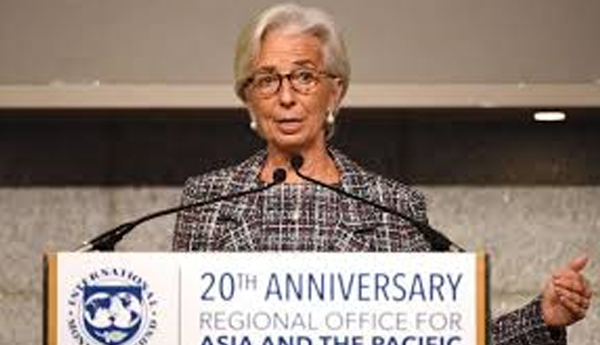Protectionist sentiment has not yet gone beyond mere words, International Monetary Fund Managing Director Christine Lagarde said on Wednesday, but would hurt Asian economies with open and free markets if it did.
International Monetary Fund (IMF) Managing Director Christine Lagarde attends a seminar to mark 20th anniversary of the launch of IMF’s Asia-Pacific Office, in Tokyo, Japan November 8, 2017. REUTERS/Issei Kato
Lagarde brushed off the concerns of some investors that the divergent monetary paths of major central banks could disrupt Asian capital flows, stressing that policymakers had the tools and means of communication needed to prevent market upheaval.
Global policymakers have raised concerns over U.S. President Donald Trump’s “America First” agenda that aims to slash U.S. trade deficits, via which Washington appears to be walking away from or extensively renegotiating multilateral trade arrangements in favour of country-by-country deals.
Lagarde said that while protectionism had not so far been seen “other than in words”, trade deals must be improved in a way that included people who felt left behind by globalization.
“If there was protectionism, it would hurt economies that are very open, and based on free and fair movement of goods and services,” Lagarde told Reuters during a visit for the 20th anniversary of the IMF’s Asia-Pacific regional office in Tokyo.
“To continue to have trade as a global engine for growth, trade deals need to be improved,” she said, adding trade pacts had to include rules on labor practices and intellectual property.
Lagarde said trade deals must be “rules based” and make use of existing dispute-settlement mechanisms such as the World Trade Organization, though she declined to say whether Trump’s trade policies complied with these rules.
The IMF head said there had been no massive capital outflows from Asia thanks to central bankers’ cautious approach and clear communication around their policy shifts.
“We believe these conditions can help to ensure that monetary policy changes do not provoke unnecessary capital flow movements,” she said.
Lagarde said she would draw a “slight distinction” between the pace of policy shifts to be adopted by the U.S. Federal Reserve and the European Central Bank.
She noted that the Fed was expected to raise interest rates steadily in coming months, while the European Central Bank had stressed that its quantitative easing would continue and interest rates would remain low for a long period of time.
“You can’t put the two – the Fed and the ECB – in the same basket,” she said.
Lagarde said Bank of Japan Governor Haruhiko Kuroda was acting appropriately by pledging to maintain the BOJ’s massive stimulus program until inflation accelerates.
“One of the strengths of central bankers is to be very clear in their communication and determined in their resolve, which clearly Governor Kuroda has demonstrated,” she said.
“One thing that is unanimously recognized is his resolve and clear determination to stay the course and to adjust when the circumstances would so require.”
Courtesy : .reuters


